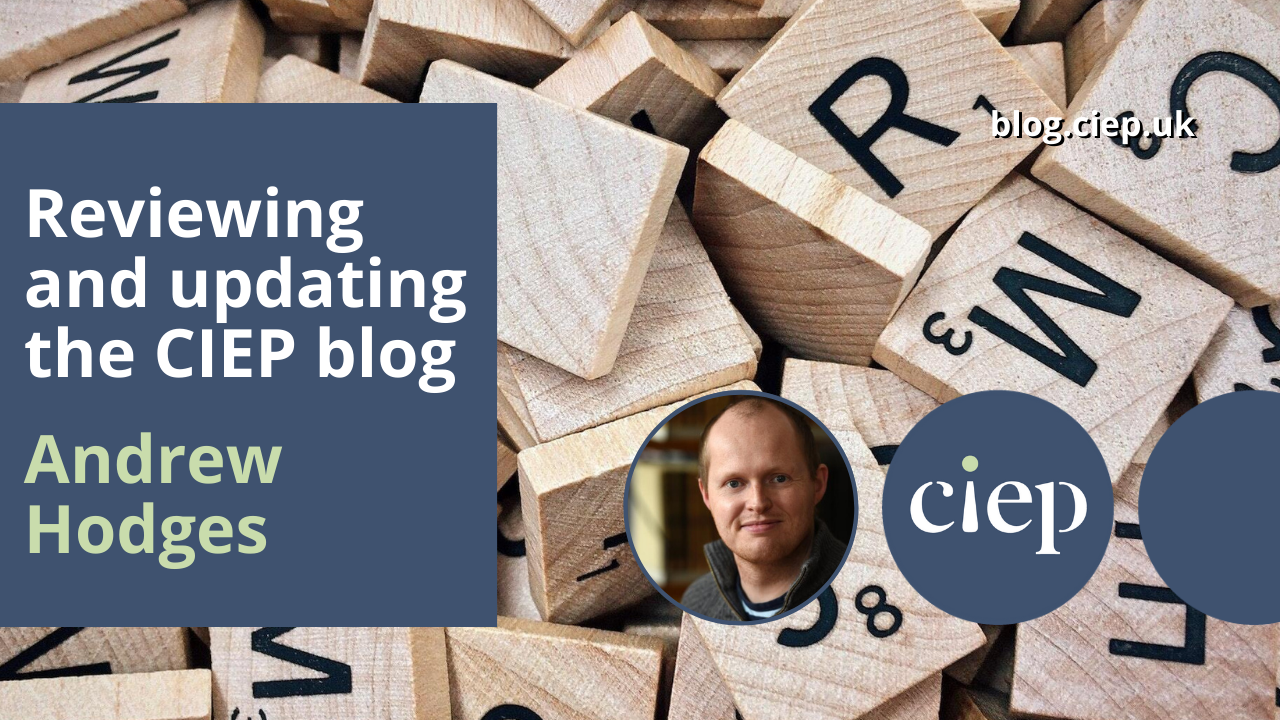Andrew Hodges, who is a member of the CIEP’s social media team, has been busy reviewing the CIEP blog to make sure our posts are still relevant, useful and discoverable. In this post he explains what this entails.
When starting a blog, simply putting content out there is a good strategy: we all know that it’s easier to edit existing copy than start with a blank page. And the CIEP has come a long way since it set up the blog in 2014. The Institute has grown a lot in recent years, and many changes currently under way reflect that growth and the Institute’s chartered status.
Just like a house, some of the blog’s furnishings and fittings still look great after eight years. Others haven’t aged so well, while others have gone completely out of style and could do with more than a revamp.
A blog is a marketing tool designed to serve its members and promote the Institute. The blog therefore needs to remain relevant, and it should be interesting and discoverable to potential members and our wider audiences.
That’s why the CIEP Council asked me to step in and review the posts, as well as the book reviews, with these goals in mind.
The good stuff
There are many excellent posts that remain relevant. These include ‘evergreen posts’ on editorial topics and business skills. How to style ellipses in New Hart’s Rules and Chicago style rarely changes, and when or if it does, that would be big editorial news!
The blog now has over 350 posts, all publicly available for free, and new ones are added most weeks.
Time for change
Some of the older posts are no longer relevant for various reasons, which is why I have reviewed them for the information team and Council.
In the first stage of my work, I divided these into posts that need a content review or deletion, and posts that need optimising. Here’s the reasoning:
Content review or deletion
Out-of-date posts: We no longer need posts on topics such as recommendations for office exercise equipment in 2016 with broken links to sales websites, or a short summary of a 2017 conference presentation. With reviewed books, a new edition may have been published.
Posts with little content: Some of the older posts are short with very little content, and other blog posts have covered these topics in more detail. Very short posts provide little value, and search engines do not rank them highly.
Posts that don’t reflect our values: Some of the older posts take positions on debates that are now old hat. Others use phrases such as ‘non-native speaker’ (when the label is attributed to others) that can cause harm. Some of these posts are still highly relevant but need a content review.
Irrelevant posts: A few posts aren’t directly relevant to the CIEP and the work that its members do.
Optimisation
SEO issues with the blog titles: Some posts have cryptic titles that sound clever. (I used to work as an academic researcher, and this was commonplace in the humanities and social sciences. It can also be fine in other contexts, it just isn’t ideal for the blog genre.)
For example, imagine that you are copyediting a report written in British English. You encounter a sentence and are unsure about whether a certain comma before ‘and’ is optional. Would you search for:
‘Commas: The Chameleon Conundrum’ or
‘Do I need to put a comma before “and”’?
Fabulous references to Culture Club aside, these kinds of tweaks to titles can make our useful evergreen content more discoverable.
Other SEO issues: Other tweaks can improve discoverability too. Each blog post should have a keyword repeated throughout the text and headings (a word or phrase that people are likely to search for online), and things like metadata, a URL that includes the keyword, ALT descriptions and image URLs that reference what is in the picture etc.
You can optimise blog posts by making content changes too. For instance, by cutting up large sentences, including more transition words etc.
But we (the information team, Council and I) have decided to focus on quick SEO wins. This means we won’t be making changes to the main body of the blog posts and book reviews (except for changing SfEP to CIEP).
Progress so far
The first step has been to review all the blog posts and book reviews briefly and come up with an initial recommendation – delete the post, optimise it or keep it as it is.
In summary, a lot of non-evergreen posts from the first three years of the blog (2014–2017) have been recommended for deletion or archiving (if they are of relevance to the CIEP’s history).
For all the suggested deletions, I’ve written a list with a short explanation of the reason for each deletion and have passed this on to the Council. Abi Saffrey, the CIEP’s information director, has reviewed this and then made the deletions.
Next steps
Now we have a trimmed-down set of blog posts and book reviews.
The next step will be to make minor changes to some blog posts (optimising them) and reviews.
These changes will include:
- changing old post titles to better reflect the content and optimise for SEO
- inserting or changing subheadings that clearly reflect the content
- deleting any remaining references to the SfEP
- making sure the URLs reflect the content
- flagging up any EDI issues for review
- checking all the images have URLs that reflect the content and inserting ALT descriptions of said images
- requesting reviews of newer editions of certain books.
We will keep a log of all changes made.
The next big change for the CIEP blog will be ensuring that all existing posts are available through the new CIEP website.
Did you write an SfEP blog post?
Most of the posts that we will change or delete were originally published when the Institute was the SfEP. If you wrote a blog post for the SfEP, you may want to check whether it is still there. If it’s not and you’re unhappy about this, get in touch and we can have a chat about possible options (perhaps you could write an updated blog post on that topic). And, of course, the same applies if you’ve written a post since we became the CIEP.
About Andrew Hodges
Andrew Hodges runs an editorial business called The Narrative Craft in Edinburgh, UK. He loves line-editing fiction and ethnography and enjoys chatting with science fiction and fantasy authors about worldbuilding and point of view issues whenever he can.
 About the CIEP
About the CIEP
The Chartered Institute of Editing and Proofreading (CIEP) is a non-profit body promoting excellence in English language editing. We set and demonstrate editorial standards, and we are a community, training hub and support network for editorial professionals – the people who work to make text accurate, clear and fit for purpose.
Find out more about:
Photo credits: letters by Pixabay; SEO blocks by Oleksandr Pidvalnyi, both on Pexels.
Posted by Harriet Power, CIEP information commissioning editor.
The views expressed here do not necessarily reflect those of the CIEP.









